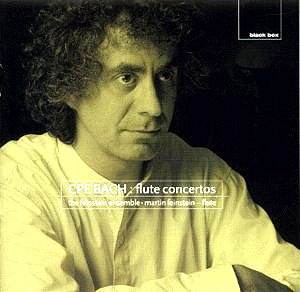 |
C. P. E. BACH
(1714-88) Crotchet AmazonUK AmazonUS Amazon recommendations |
It is possible that these concertos were written for the virtuoso Johann Joachim Quantz, who was a contemporary of C. P. E. Bach's at the court of Frederick II of Prussia. They are certainly virtuoso in manner and may well have been beyond the more modest capabilities of Frederick himself.
The D minor concerto exists in versions for either flute or harpsichord. There is a distinct 'Sturm und Drang' element to the first movement. As in all the music on this disc, the Feinstein Ensemble are just as impressive as their director in the care they show to each and every stress. The finale is just the sort of thing that C. P. E. Bach is famous for. Explosive and adventurous, this is real virtuoso stuff and Feinstein and his ensemble give it all they have got.
There are three versions of the A major Concerto: flute, cello and keyboard, although which one might have been Bach's preference is impossible to ascertain. After a vigorous first movement, there is a profound slow movement marked 'Largo con sordini, mesto', restful and speaking of a very private inner world. Here Feinstein and his Ensemble are at their best: this movement is the highlight of the disc. The joyous Allegro assai finale brings the listener back into the light of day.
Finally, the G major exists in versions for either flute or organ. Again, Feinstein's virtuosity makes for compelling listening.
The recording is exemplary (Black Box have shown themselves repeatedly to be capable of stunning results on this score). This is an arresting disc that reminds us once again that the music of this particular Bach son is infinitely fascinating and often surprising.